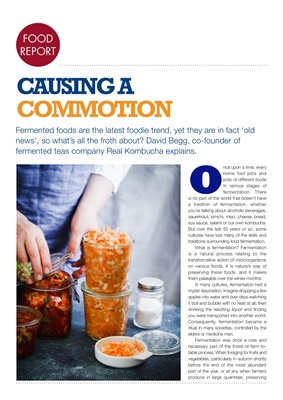
LIVINGLIVING
CAUSING A
COMMOTION
Fermented foods are the latest foodie trend, yet they are in fact 'old
news', so what's all the froth about? David Begg, co-founder of
fermented teas company Real Kombucha explains.
O
nce upon a time, every
home had pots and
pots of different foods
in various stages of
fermentation. There
is no part of the world that doesn't have
a tradition of fermentation, whether
you're talking about alcoholic beverages,
sauerkraut, kimchi, miso, cheese, bread,
soy sauce, salami or our own kombucha.
But over the last 50 years or so, some
cultures have lost many of the skills and
traditions surrounding food fermentation.
What is fermentation? Fermentation
is a natural process relating to the
transformative action of microorganisms
on various foods. It is nature's way of
preserving these foods, and it makes
them palatable over the winter months.
In many cultures, fermentation had a
mystic fascination. Imagine dropping a few
apples into water and over days watching
it boil and bubble with no heat at all, then
drinking the resulting liquor and finding
you were transported into another world.
Consequently, fermentation became a
ritual in many societies, controlled by the
elders or medicine men.
Fermentation was once a core and
necessary part of the forest-or-farm-totable process.
When foraging for fruits and
vegetables, particularly in autumn shortly
before the end of the most abundant
part of the year, or at any when farmers
produce in large quantities, preserving
FOOD
REPORT